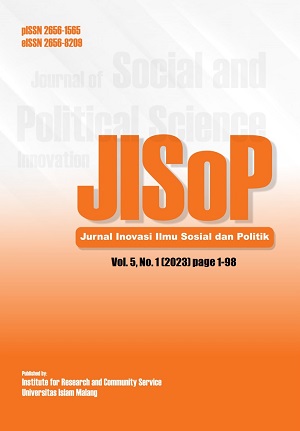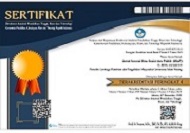Political education regarding concept of nationality in the perception of modernist islamic politics in Indonesia
DOI:
https://doi.org/10.33474/jisop.v5i1.19823Keywords:
political perception, political education, islam modernistAbstract
The plurality of political perceptions in Indonesia certainly gives rise to a diversity of political understandings. In some situations, this can lead to unexpected extreme political disparities, including those that arise in modern Islamic political thought. Political education as an instrument for unifying the nation's political interests has a strategic role in overcoming this problem. Thus, an objective study is needed to analyze the perceptions of modernist Islamic groups in viewing political and national education. This research was conducted to: 1) find out the perceptions of modernist Islamic political activists in Indonesia about the state; 2) and modernist Islamic political perceptions of political education. The research was conducted on modern Islamic political activists represented by the Regional Leadership Council of Partai Keadilan Sejahtera in Bandung City. This research approach uses a qualitative approach with descriptive methods. Data collection techniques using interviews, observation, and documentation studies. The results of the study show that there is objectification of Islamic political thought in viewing political education to strengthen commitment to the nation.
References
Al-Jarhi, M. A. (2016). The Islamic Political System: A Basic Value Approach. In MPRA Paper No. 72706. University Library of Munich, Germany.
Ali, M. (2014). Nationalism and Islam : perspective of Egyptian and Syrian Muslim intellectuals. Indonesian Journal of Islam and Muslim Societies, 4(1), 51–79. https://doi.org/10.18326/ijims.v4i1.51-79
Alvin, S. (2020). Strategi Komunikasi Politik Juru Bicara Wakil Presiden 2014-2019 sebagai Humas Pemerintah. Jurnal Komunikasi, 14(1), 43–62. https://doi.org/10.21107/ilkom.v14i1.6031
Anukriti, S., & Chakravarty, A. (2019). Political Aspirations in India: Evidence from Fertility Limits on Local Leaders. Journal of Human Resources, 54(1), 79–121. https://www.iza.org/publications/dp/9023/political-aspirations-in-india-evidence-from-fertility-limits-on-local-leaders
Booysen, S. (2011). The ANC and the regeneration of political power 1994-2011. One Hundred Years of the ANC: Debating Liberation Histories and Democracy, 1–21.
Creswell. (2013). Research Design Pendekatan Kualitatif, Kuantitatif, dan. Mixed, edisi ketiga. Pustaka Pelajar.
European Commision for Democracy Through Law. (2020). Guidelines on Political Party Regulation Approved by the Council of Democratic Elections at its 69th online meeting ( 7 October 2020 ) and Adopted by the Venice Commission at its 125th online Plenary Session ( 11-12 December 2020 ) on the basis of comment. 881.
Fossati, D. (2019). The Resurgence of Ideology in Indonesia: Political Islam, Aliran and Political Behaviour. Journal of Current Southeast Asian Affairs, 38(2), 119–148. https://doi.org/10.1177/1868103419868400
Ghannouchi, R. (2022). Public Freedoms in the Islamic State (D. L. Johnston (ed.)). Yale University Press.
Harahap, I. (2017). Kaderisasi Partai Politik Dan Pengaruhnya Terhadap Kepemimpinan Nasional. Universitas Bakrie, Jakarta.
Hardani, Auliya, N. H., Andriani, H., Fardani, R. A., Ustiawaty, J., Utami, E. F., Sukmana, D. J., & Istiqomah, R. R. (2020). Metode Penelitian Kualitatif & Kuantitatif (H. Abad (ed.)). Pustaka Ilmu.
Hermawan, I. C. (2020). Implementasi Pendidikan Politik Pada Partai Politik di Indonesia. Jurnal Pendidikan Politik, Hukum Dan Kewarganegaraan, 10(1), 1–19. https://jurnal.unsur.ac.id/jpphk/article/view/939
Kösebalaban, H. (2014). Muslim perceptions of injustice as an international relations question. Perceptions: Journal of International Affairs, 19(4), 19–42. https://dergipark.org.tr/en/pub/perception/issue/48963/624624
Manoppo, V. L. (2014). The Customers Perception Toward Mareting Mix Of Hypermart, Multi Mart, And Freshmart Manado. Jurnal EMBA : Jurnal Riset Ekonomi, Manajemen, Bisnis Dan Akuntansi, 2(4), 613–620. https://doi.org/10.35794/emba.2.4.2014.6414
Nassaji, H. (2015). Qualitative and descriptive research: Data type versus data analysis. Language Teaching Research, 19(2), 129–132. https://doi.org/10.1177/1362168815572747
Owen, G. T. (2014). Qualitative Methods in Higher Education Policy Analysis: Using Interviews and Document Analysis. The Qualitative Report, 19(26), 1–19. https://doi.org/10.46743/2160-3715/2014.1211
Pramana, G. I. (2015). Politik Aliran di Bali Pasca Soeharto. GOVERNMENT : Jurnal Ilmu Pemerintahan, 8(2), 59–72. https://doi.org/10.31947/jgov.v8i2.111
Putra, T. F. (2021). Persepsi Politik Kader Partai Keadilan Sejahtera terhadap Hubungan Islam dan Kenegaraan dalam Perspektif Pendidikan Kewarganegaraan. Universitas Pendidikan Indonesia.
Rahman, H. (2021). The Perception of Muslim Democracy in the Political Thought of Rachid Ghannouchi. Akademik Hassasiyetler, 8(15), 361–376.
Ridwan. (2021). Kenegarawan Kepemimpinan Partai Politik Guna Mewujudkan Konsolidasi Politik Pasca Pemilu 2019. PARAPOLITIKA Journal of Politics and Democracy, 2(1), 31–46. https://parapolitika.upnvj.ac.id/index.php/pp/article/view/16
Rivai. (2013). Kepemimpinan dan Perilaku Organisasi. PT. Raja Grafindo Persada.
Robbins. (2015). Perilaku Organisasi. Penerbit Salemba Empat.
Rokhmad, A. (2014). Dasar Negara Dan Taqiyyah Politik Pks. Walisongo: Jurnal Penelitian Sosial Keagamaan, 22(1), 1. https://doi.org/10.21580/ws.2014.22.1.255
Sugiyono. (2010). Metode Penelitian Kuantitatif Kualitatif dan R&D. Alfabeta.
Downloads
Published
How to Cite
Issue
Section
License
Copyright (c) 2023 Tarekh Febriana Putra, Cecep Darmawan, Leni Anggraeni

This work is licensed under a Creative Commons Attribution-ShareAlike 4.0 International License.
.



_-_Copy.jpg)





